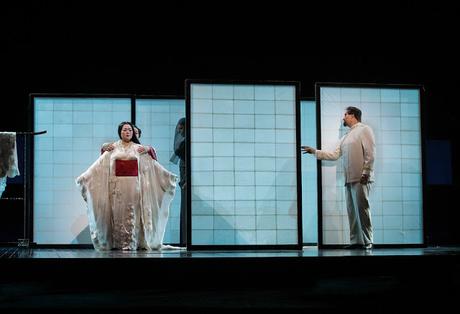by Paul J. Pelkonen

The bad lieutenant: Pinkerton (Roberto Aronica) peeps on Butterfly (Hui He) on their wedding night.
Photo by Ken Howard © 2017 The Metropolitan Opera.
Mr. Minghella’s aesthetic achievement has survived unscathed. The set remains black and glossy, its smooth rake evoking the steep hillside leading to Butterfly’s house. Backgrounds are simple colors, glowing brightly to evoke turning seasons or the time of day. The costumes are still culturally accurate, rendered in colorful fabrics and painstaking detail. All this brings immediacy to the tragedy: the story of a fifteen-year-old geisha married, impregnated and abandoned by a callow American naval lieutenant.
The problem with the latest revival of this show (seen Thursday night from a rush seat in the orchestra) is with the singers themselves. Soprano Hui He has some of the right qualities for this most demanding of leading roles. She sang her entrance with dulcet tones, executing the neat little vocal fillip where Butterfly seats the guests and takes command of her own wedding. She was coquettish, warm and finally heart-melting in the big Act I duet, yielding to Pinkerton’s entreaties under the arc of Mr. Minghella’s paper lanterns.
In the plot of Butterfly, three years pass between the first and second acts. However, Ms. Hui sounded as if she’d aged a fair bit longer. “Un bel di” came off as rote: she knew the aria well enough but did not inject its arcing phrases with the warmth, passion and hint of crazed desperation that Puccini calls for. Worse yet, the big, climactic final note disappeared into itself, coming out as a tiny squeak. The third act was an improvement. Her final scene was marvelously acted and well sung, but this house is not right for her voice.
If Pinkerton does not have a beautiful voice, his wooing of Butterfly comes off as complete cynicism. Mr. Aronica has a bright tenor that turns sharp and crystalline when placed under pressure. This sound underwrote his seduction of Butterfly with a certain ugly quality that made one wonder why she fell for this guy in the first place. His appearance in the third act wasn’t much better, with Pinkerton’s aria (added by the composer in the opera’s revision) coming off as gratuitous and false.
As Sharpless, David Bizic (a new voice to these ears) might have had the best night of anyone in the cast. His character is bumbling and ineffectual but the empathy he poured forth in the second and third acts felt real. Tenor Tony Stevenson was the opposite as the oily marriage broker Goro, an embodiment of sleazy opportunism. Mezzo Maria Zilchak was strong casting as the matronly servant Suzuki, who looks after Butterfly. Mention must be made of Met first-timer Kidon Choi. His stately presence presence and pleasing voice made for a strong debut as Prince Yamadori.
In the evening’s other debut, the young Italian conductor Jader Bignamini did a credible job in the Met pit. He cast clear musical arcs in each of the three acts and supported the singers, making sure the orchestra never once drowned them out. His performance shone some much-needed light on the details and rococo splendor of this score. Hopefully, as audiences harvest this year’s crop of Butterfly performances, they will find a better principal cast in the months to come.

